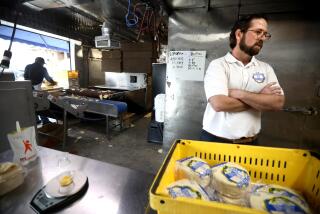Green leafy libel
IT’S OK IF YOU DON’T WANT TO eat your vegetables -- but don’t even think about insulting them. If a bill recently introduced in Sacramento becomes law, libeling a legume in California could get very expensive.
Legislation aimed at protecting agriculture too often shares one characteristic with the crops themselves: Both thrive in a manure-rich environment. High farm subsidies, for instance, are self-destructive. But at least they don’t impinge on basic civil rights. So-called veggie libel laws, however, do.
Last week, Assemblywoman Audra Strickland (R-Thousand Oaks) introduced AB 698, which would allow growers to sue those who abuse their asparagus -- or their spinach, or broccoli or any other “perishable agricultural product.” The bill states that the disparagement could be disseminated to the public “in any manner.” So any food-purity fanatic with a blog and a distaste for genetically modified crops or E. coli in his spinach could get an unpleasant notice from a lawyer.
Food libel laws started springing up after CBS’ “60 Minutes” aired an episode in 1989 about the chemical Alar, thought to be a carcinogen, being sprayed on apple trees. Now 13 states have such laws, which got their first court test in 1996, when Texas cattle ranchers used the state’s agricultural libel law to sue talk-show host Oprah Winfrey because she aired an episode critical of practices thought to increase the risk of mad cow disease. They lost the case. That didn’t discourage Strickland, who introduced her bill after the state’s growers were hit hard by an E. coli outbreak last fall traced to California bagged spinach.
The idea of extending libel laws to vegetables seems laughable enough on its face to ensure its extinction. Yet such laws cannot be simply laughed off. One of the purposes of the 1st Amendment is to encourage debate, and food libel laws would have a chilling effect on this speech. Though plaintiffs under Strickland’s bill would have to prove that defendants knew their statements to be false, or acted with reckless disregard for the truth, the threat of a lawsuit alone is enough to discourage many people from speaking out.
There’s a better way to protect farmers from rumors. After losing the Winfrey case, Texas ranchers set up a hotline for people to call if they heard anyone in the media trashing red meat. The offending radio or TV host is then hit with a flood of materials about the health benefits of T-bones. That kind of aggressive PR may not always be pleasant. But it’s preferable to laws against criticizing your spinach.


